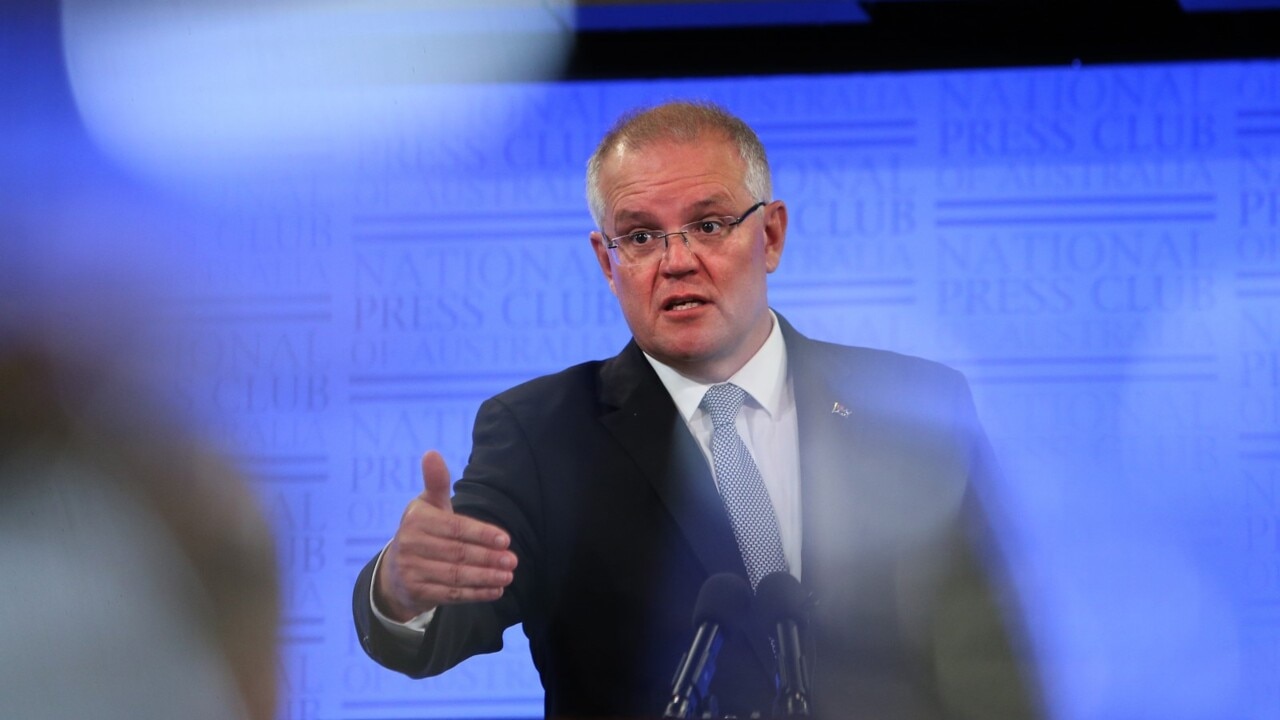Scott Morrison says Coalition won’t soften stance on asylum-seekers
Scott Morrison says he will not move to a “middle ground” on medical transfers of refugees, while outlining his election strategy.

Scott Morrison says he will not move to a “middle ground” on the medical transfer of refugees due to the possibility of deaths if the people-smuggling trade restarts.
The Prime Minister, in response to questions at the National Press Club, gave his comprehensive rebuttal of the Phelps bill and said it was “superfluous” and “unnecessary”.
“The minister today has those powers and responsibilities. It already exists. I don’t need to give them those powers. They already have them,” he said.
“This bill is unnecessary. It’s superfluous. It adds nothing to border protection and therefore, its passage in any form takes us backwards. You don’t need this bill to ensure that Australia has control of its borders. We already do.
“I’m not going to find a middle ground. You can split the difference on 1,200 deaths. You can’t split the difference on 50,000. What, we’ll settle on 25,000? No.
“On national security, on border protection, these things are absolutes — and Labor never gets this … I don’t trade on national security but Bill Shorten clearly is indicating that that’s what he’d do, and I don’t think that makes Australia stronger.”
Advocates of the Phelps bill have argued that warnings offshore detention would be effectively dismantled if it passed, as medical transfers have occurred before.
Mr Morrison said previous medical transfers from offshore detention to Australia were different because they were co-ordinated and decided by the elected government, not by independent doctors with different priorities.
“These transfers have occurred quietly, under the existing policy. And they’ve been done by the Government, not by anyone else. They’ve been done by our decisions,” he said.
“The problem with the Bill is, it takes control from the Government, the elected Government, which has to take into account all the considerations that impact on the nation’s interests and subcontract it out to others who don’t have those same interests or responsibilities.”
PM churn ‘not an election issue’
The next election will chart the nation’s course for a decade and will not be a referendum on the Liberal Party’s recent churn of prime ministers, Scott Morrison says.
In an address to the National Press Club, the Prime Minister set out his plan to strengthen the nation’s security over a series of fronts, from the economy to borders to stopping domestic violence.
Mr Morrison also set out his battle lines for the next election, due for May, and said it would be a choice between his “Stronger Australia” and a “weaker Australia” under Bill Shorten.
“A track record of performance, but more importantly, a plan to make sure that we continue to create the strong Australia that Australians want to live in for the next decade,” he said.
“Make no mistake — the election is about the Australia you want to live in for the next decade.”
“Do you want to live in a stronger Australia under my government? Or do you want to live in a weaker Australia under Bill Shorten and Labor?”
Mr Morrison faced several questions from reporters after his speech on why the Coalition should be trusted to retain government after dumping two prime ministers since 2013.
But the Prime Minister argued the Labor Rudd-Gillard government was ousted by voters due to policy failures, and not its own churn of party leaders.
“People can rightly say that we’ve had three prime ministers — that is true. What they cannot say is that we’ve mismanaged the finances,” he said.
“They cannot say that we’ve mishandled the borders or failed to invest in the Defence Forces or secure our position in the Pacific and the broader Indo-Pacific region. They can’t say we haven’t worked with state and territories to bring about record funding for schools and hospitals.
“The great myth of the 2013 election was that Labor was thrown out only because they had too many prime ministers. They were thrown out because they were a joke in government and they will be again.”




